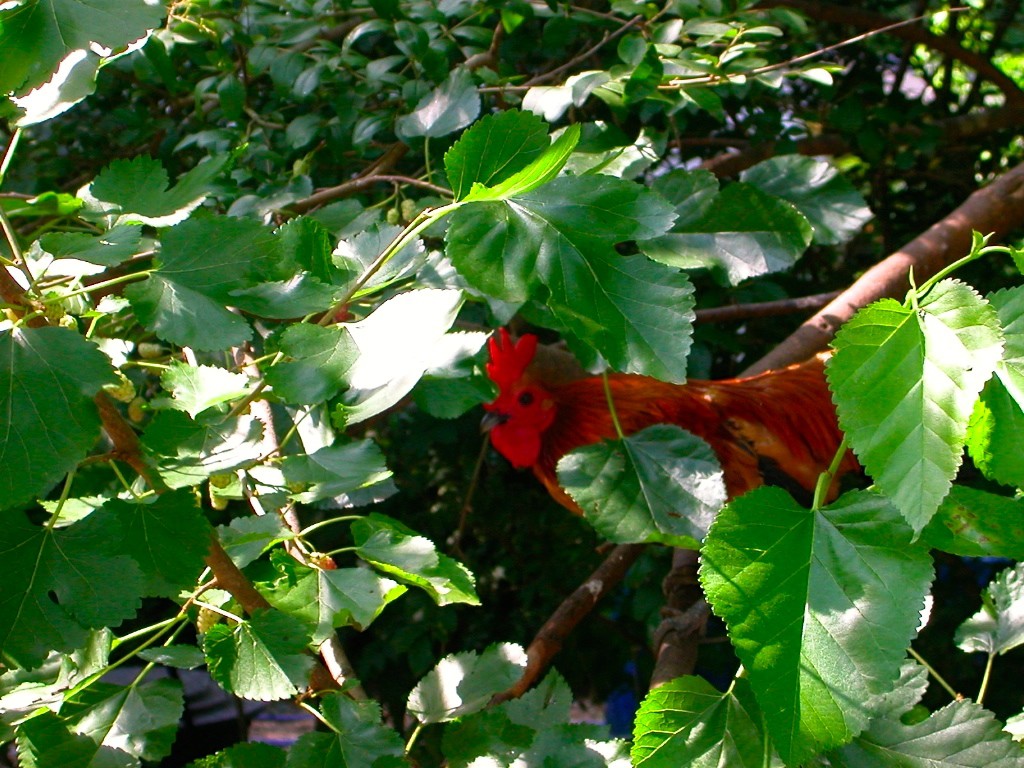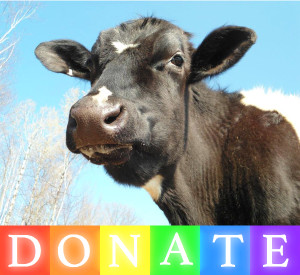During the Queering Animal Liberation discussions and workshops I have led over the years, male attendees often tell a story that illuminates the intersections of speciesism, sexism, and homophobia. The details of the story vary, but the gist is always the same: A man or boy—whether actually gay or not—is mocked as a “sissy” or similarly trans/homophobic term for refusing to eat meat.
As this Father’s Day blog post notes, and as friend-of-the-sanctuary Carol Adams has detailed in her classic book, The Sexual Politics of Meat, meat consumption and masculinity are closely associated in U.S. culture. The linkage is deep and not limited to this country, dating back to the days when daughters and dairy cows both were property of husbands [yup–that’s where that word “husbandry comes from”] who also owned their wives.
But notice that I said that the men who tell this story have not been uniformly gay. And notice the intellectual slippage that leads the befogged minds of the haters from vegetarian to feminine to gay. This clues us into a key fact about homophobia, which is that it’s not about homosexuality at all. Sure, some people are homophobic in the sense of being ignorantly bigoted against gay men, lesbians, or anybody else who departs from the straight and decidedly narrow. But, as Suzanne Pharr ably demonstrated in her classic text, the structural role of homophobia is to be A Weapon of Sexism (pdf). Homophobia, and transphobia too, serve as battering rams with which gender roles are enforced.
And so, when a boy is called gay—with the underlying presumption that that’s a bad thing—because he doesn’t want to go hunting, the hurtful, reverberating thud comes from a particularly powerful conjunction of speciesism, sexism, and homophobia. We need to see all three, and the ways that they intersect, if we want to contribute to the progressive project of undermining gender roles that injure children while perpetuating an unjust social structure.
Speaking of Father’s Day and intersections of oppression, I’d be remiss if I didn’t mention the potent conjunction of sexism, speciesism, homophobia, and racism implicit in the oft-repeated notion that the involvement of fathers is essential to the health of human children. Far be it for me to quibble with any father who wants to be more nurturing to his children or, even better, help them see the falsity of projecting gender onto personality characteristics such as kindness toward animals or a liking for trucks. I’ll even grant that, in cultures that privilege families with fathers, children without known or involved fathers may experience disadvantage.
But here’s the problem: It’s specifically patriarchal cultures that privilege families with fathers. And, while it certainly is true that all children require fathers in the biological sense, it is certainly not true that paternal involvement is the norm for animals, mammals, apes, or even our own species. As I mentioned during last year’s Pride Drive, nonhuman animals vary wildly (pun intended) in the strategies they have evolved for the care, feeding, and protection of offspring.

The tiny rooster known as “Mighty Mouse” often parented motherless chicks
As for us, well, behavioral plasticity may be our most defining feature. As humans moved from place to place, different groups evolved different ways of adapting to their environments, including very different methods of constructing families and raising children. In many of those methods, biological fathers were not individually involved in the care of their own offspring, although they might have been personally responsible for their sisters’ children or collectively responsible for extending some sort of care to all children.
How did it come to be, then, that almost everybody assumes that something has gone dreadfully awry if a child is raised within his mother’s family or enjoys the dedicated protection of his mother, her best friend, and a passel of neighbors? We’re back to the same sorry story that brought cockfighting, dairying, racism and homophobia to these shores: conquest. Patriarchal cultures not only elevate fathers by subordinating everybody else, they also tend to solve their problems by violence. The European conquest of the Americas can be seen as a fairly late stage of the process by which what were once a small subset of human cultures solved their economic and ecological problems by invading other places, carrying ideas along with weapons.
In patriarchal cultures, “father” is king, the owner or at least ruler of women, children, and animals. The whole system crumbles if fatherless families are allowed to flourish. Many of the cultures steamrolled in the process of European imperialism and colonialism structured their communities and families differently than the patriarchal coupling prescribed by Christianity. Oftentimes, these differences in parenting practices were cited as justification for dispossession and genocide.
So, while Father’s Day is a fine time to laud the care-giving of folks like little Mighty Mouse — a rooster at the sanctuary who, for many years, adopted and parented motherless chicks who often grew to be many times his size — I persistently wish that those of us who question everything else might seize this day to challenge what, exactly, we mean by “father” and why we think that social role is so important.
This Father’s Day reflection is part of our Pride series.
To support VINE’s education and outreach efforts, donate today.

Fatherhood, Diversity & Animal Families
During the Queering Animal Liberation discussions and workshops I have led over the years, male attendees often tell a story that illuminates the intersections of speciesism, sexism, and homophobia. The details of the story vary, but the gist is always the same: A man or boy—whether actually gay or not—is mocked as a “sissy” or similarly trans/homophobic term for refusing to eat meat.
As this Father’s Day blog post notes, and as friend-of-the-sanctuary Carol Adams has detailed in her classic book, The Sexual Politics of Meat, meat consumption and masculinity are closely associated in U.S. culture. The linkage is deep and not limited to this country, dating back to the days when daughters and dairy cows both were property of husbands [yup–that’s where that word “husbandry comes from”] who also owned their wives.
But notice that I said that the men who tell this story have not been uniformly gay. And notice the intellectual slippage that leads the befogged minds of the haters from vegetarian to feminine to gay. This clues us into a key fact about homophobia, which is that it’s not about homosexuality at all. Sure, some people are homophobic in the sense of being ignorantly bigoted against gay men, lesbians, or anybody else who departs from the straight and decidedly narrow. But, as Suzanne Pharr ably demonstrated in her classic text, the structural role of homophobia is to be A Weapon of Sexism (pdf). Homophobia, and transphobia too, serve as battering rams with which gender roles are enforced.
And so, when a boy is called gay—with the underlying presumption that that’s a bad thing—because he doesn’t want to go hunting, the hurtful, reverberating thud comes from a particularly powerful conjunction of speciesism, sexism, and homophobia. We need to see all three, and the ways that they intersect, if we want to contribute to the progressive project of undermining gender roles that injure children while perpetuating an unjust social structure.
Speaking of Father’s Day and intersections of oppression, I’d be remiss if I didn’t mention the potent conjunction of sexism, speciesism, homophobia, and racism implicit in the oft-repeated notion that the involvement of fathers is essential to the health of human children. Far be it for me to quibble with any father who wants to be more nurturing to his children or, even better, help them see the falsity of projecting gender onto personality characteristics such as kindness toward animals or a liking for trucks. I’ll even grant that, in cultures that privilege families with fathers, children without known or involved fathers may experience disadvantage.
But here’s the problem: It’s specifically patriarchal cultures that privilege families with fathers. And, while it certainly is true that all children require fathers in the biological sense, it is certainly not true that paternal involvement is the norm for animals, mammals, apes, or even our own species. As I mentioned during last year’s Pride Drive, nonhuman animals vary wildly (pun intended) in the strategies they have evolved for the care, feeding, and protection of offspring.
The tiny rooster known as “Mighty Mouse” often parented motherless chicks
As for us, well, behavioral plasticity may be our most defining feature. As humans moved from place to place, different groups evolved different ways of adapting to their environments, including very different methods of constructing families and raising children. In many of those methods, biological fathers were not individually involved in the care of their own offspring, although they might have been personally responsible for their sisters’ children or collectively responsible for extending some sort of care to all children.
How did it come to be, then, that almost everybody assumes that something has gone dreadfully awry if a child is raised within his mother’s family or enjoys the dedicated protection of his mother, her best friend, and a passel of neighbors? We’re back to the same sorry story that brought cockfighting, dairying, racism and homophobia to these shores: conquest. Patriarchal cultures not only elevate fathers by subordinating everybody else, they also tend to solve their problems by violence. The European conquest of the Americas can be seen as a fairly late stage of the process by which what were once a small subset of human cultures solved their economic and ecological problems by invading other places, carrying ideas along with weapons.
In patriarchal cultures, “father” is king, the owner or at least ruler of women, children, and animals. The whole system crumbles if fatherless families are allowed to flourish. Many of the cultures steamrolled in the process of European imperialism and colonialism structured their communities and families differently than the patriarchal coupling prescribed by Christianity. Oftentimes, these differences in parenting practices were cited as justification for dispossession and genocide.
So, while Father’s Day is a fine time to laud the care-giving of folks like little Mighty Mouse — a rooster at the sanctuary who, for many years, adopted and parented motherless chicks who often grew to be many times his size — I persistently wish that those of us who question everything else might seize this day to challenge what, exactly, we mean by “father” and why we think that social role is so important.
This Father’s Day reflection is part of our Pride series.
To support VINE’s education and outreach efforts, donate today.